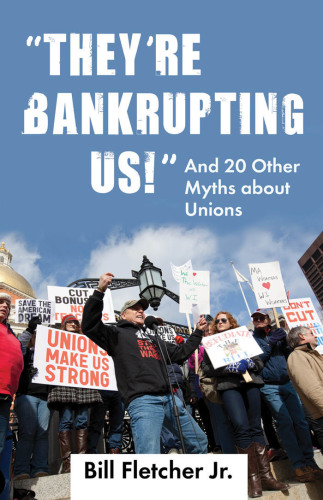
They're Bankrupting Us!
And 20 Other Myths about Unions
کتاب های مرتبط
- اطلاعات
- نقد و بررسی
- دیدگاه کاربران
نقد و بررسی

April 23, 2012
In his latest, labor leader Fletcher (Solidarity Divided: The Crisis in Organized Labor and a New Path Toward Social Justice) tackles the subject of labor unions and the slanderous assault they’ve endured in the media. Divided into 21 sections, each focused on a different myth, readers learn about the history of labor reform in America—from its humble beginnings at the end of the world wars, through the civil rights and women’s movements, until today. The argument that the ”employer class” holds incredible influence in the workplace feels timely, and the ways in which unions can help level the playing field is clearly rendered. The book is at its best when offering nuanced evaluations of America unions, acknowledging past shortcomings with regard to membership diversity or organizational failures. However, the book doesn’t address the necessity of unions in a time when jobs are being outsourced to countries where employees make fewer demands. While global unionization and outsourcing are touched upon, the dwindling job market feels like an oversight that hangs over much of the book. Though the benefits that labor unions have with regard to negotiations and creating a positive work environment are numerous, they are irrelevant if the jobs are not there to begin with.

July 1, 2012
Talking points to help trade unionists and their supporters rebut conservative attacks. Fletcher (co-author: Solidarity Divided: The Crisis in Organized Labor and a New Path toward Social Justice, 2009, etc.), the director of field services for the American Federation of Government Employees, organizes his argument as a refutation of 21 "myths" that opponents typically use to discredit unions. His historical context begins in the early 19th century, when unionists fought bloody battles to win the right to organize. By the end of World War II, at the height of their power, unions had consolidated gains won during the New Deal. They were considered to be "a part of the so-called mainstream," although their numbers never exceeded "35 percent of the non-agricultural workforce." A turnabout began during the Reagan administration, when the president fired striking air traffic controllers. Fletcher makes a strong case that the slogan "right to work" is a misnomer because without a labor organization to defend their interests, individual workers are without job protection. In answer to the first myth--"Workers are forced to join unions, right?" he responds, "The phrasing of a right to work statutes suggest they are about freedom of choice. Actually, they are not. They are about weakening the ability of workers--as a group--from exerting any sort of power." Throughout, the author elaborates on the theme of the necessity of workers to be free to organize in order to fight for their own rights and also to stand up for social justice. He suggests that deceptive language is deliberately used to disparage unions and that today, unions are becoming increasingly marginalized by unemployment and outsourcing. These circumstances can only be turned around, writes Fletcher, when people assume responsibility for fighting for social justice for all working men and women. An effective presentation of the importance of trade unions in a democracy.
COPYRIGHT(2012) Kirkus Reviews, ALL RIGHTS RESERVED.

























دیدگاه کاربران